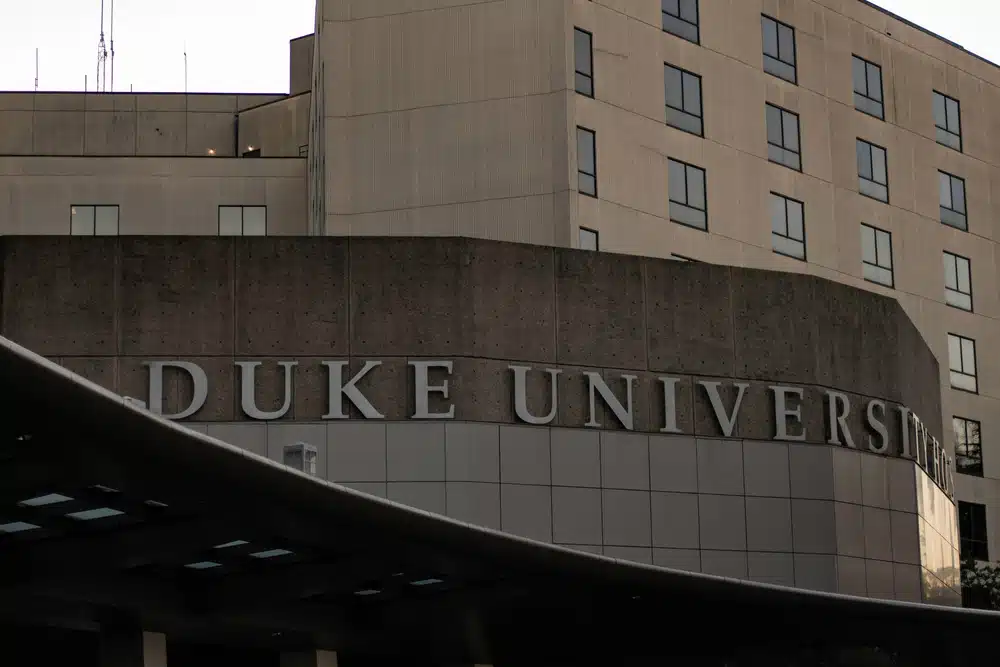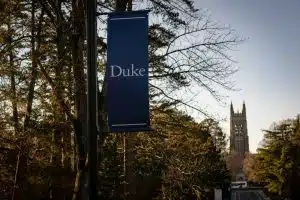How to Ace Your Duke Interview
For many prospective Duke University students, facing admission interviews can seem daunting. But, with the right approach and a deep understanding of the process, you can turn this hurdle into an opportunity to shine. This article provides a comprehensive guide to acing your Duke University interview.
Understanding the Purpose of the Duke Interview
Before we discuss strategies to ace your Duke interview, it is essential to understand its purpose in the admission process and what the university looks for in prospective students. By comprehending these aspects, you can tailor your preparation and approach to meet the university’s expectations.
The Role of the Interview in the Admissions Process
The Duke University interview forms a critical part of the undergraduate admissions process. It provides admissions officers additional insight into your academic capabilities, values, and passion beyond what’s reflected in your application documents.
During the interview, you will have the opportunity to engage in a conversation that goes beyond your grades and extracurricular activities. Admissions officers are interested in understanding your thought process, how you handle challenges, and how you communicate your ideas. This interview is not just a formality; it is a chance for you to showcase your unique qualities and demonstrate why you would be a valuable addition to the Duke community.
Furthermore, the interview allows admissions officers to assess your fit with the university’s values and culture. They want to see if you align with Duke’s commitment to excellence, collaboration, and making a positive impact on society. By participating in the interview, you can demonstrate your enthusiasm for these values and show that you are genuinely interested in becoming a part of the Duke community.
What Duke Looks for In Prospective Students
Duke University seeks intellectually exciting students with diverse backgrounds and perspectives capable of challenging themselves and those around them. They value integrity, resilience, and a commitment to improving the community.
During the interview, it is crucial to highlight these qualities and demonstrate how they have shaped your experiences and aspirations. Admissions officers want to see that you have a genuine passion for learning, a curiosity that drives you to explore new ideas, and a willingness to step out of your comfort zone to make a difference.
Moreover, Duke values students who are not only academically strong but also possess a sense of social responsibility. They want individuals who are committed to making a positive impact on the world and who will actively contribute to the university’s mission of knowledge in the service of society. Use the interview as an opportunity to showcase your involvement in community service, leadership roles, or any other experiences that demonstrate your commitment to improving the lives of others.
By effectively conveying these values during your interview, you can establish a distinct connection with Duke’s culture and strengthen your chances of being admitted. Remember, the interview is not just about answering questions; it is about telling your story and demonstrating why you are a perfect fit for Duke University.
Preparing for Your Duke Interview
Preparation plays a crucial role in your interview success. It involves understanding Duke University apart from preparing to answer common interview questions.
When it comes to preparing for your Duke interview, there are several key steps you can take to ensure you are ready to impress the interviewer. One of the most important aspects of preparation is researching Duke University itself. By having a solid understanding of the university—the programs it offers, its values, traditions, and culture—you can demonstrate to the interviewer that you have done your homework and are genuinely interested in the institution.
Researching About Duke University
Looking into the specific degree program you desire to pursue and the faculty associated with it is a great way to show your dedication and enthusiasm. By familiarizing yourself with the faculty members, their research interests, and their accomplishments, you can demonstrate that you are not only interested in the program but also knowledgeable about the individuals who will be guiding your academic journey.
In addition to understanding the faculty, it is important to delve into the university’s research initiatives. Duke University is renowned for its groundbreaking research in various fields. By familiarizing yourself with the ongoing research projects and initiatives, you can showcase your passion for learning and your desire to contribute to the university’s intellectual community.
Furthermore, it is essential to explore Duke University’s commitment to community service. The university places a strong emphasis on giving back and making a positive impact on society. By understanding the various community service programs and initiatives at Duke, you can demonstrate your alignment with the university’s values and showcase your own dedication to making a difference.
Lastly, gaining insight into Duke University’s approach to learning is crucial. The university is known for its innovative and interdisciplinary approach to education. By familiarizing yourself with the unique learning opportunities and resources available at Duke, you can highlight your enthusiasm for intellectual exploration and your eagerness to engage in a vibrant academic environment.
Anticipating Common Interview Questions
While every interview is different, certain questions are frequently asked during Duke University interviews. It is important to anticipate these questions and prepare thoughtful and well-constructed responses.
Some common interview questions you may encounter include inquiries about your academic interests, extracurricular activities, why you are interested in Duke University, and your long-term goals. By reflecting on these questions and formulating articulate responses, you can set a positive tone for the interview and demonstrate your preparedness and motivation.
When discussing your academic interests, be sure to highlight specific areas of study that align with your passions and career goals. Additionally, when discussing your extracurricular activities, emphasize the skills and experiences you have gained that make you a well-rounded and engaged student.
When explaining why you are interested in Duke University, be genuine and specific. Discuss the unique opportunities and resources that Duke offers that align with your academic and personal aspirations. Finally, when discussing your long-term goals, articulate how Duke University’s academic environment and community will support your ambitions and help you achieve success.
Making a Positive Impression
A positive impression goes beyond answering questions correctly—it also involves dressing appropriately and displaying confidence and authenticity.
When it comes to making a positive impression, there are several factors to consider. Dressing professionally for the interview is one of them. Your choice of attire sends a message to the interviewer that you take the opportunity seriously. A formal or business-casual outfit tends to work best in most professional settings. However, it’s vital to focus on feeling comfortable too, as this can affect your confidence. Dressing in clothes that fit well and make you feel good can contribute to your overall sense of self-assurance.
But it’s not just about the clothes you wear. Displaying confidence and authenticity is equally important. The interviewer is eager to know the real you beyond what is written on your resume. So, be genuine and honest in your interactions. Share your experiences and accomplishments in a way that reflects your true self. Display confidence in your achievements without boasting, as humility is also valued. Maintain steady eye contact with the interviewer, as it shows that you are engaged and attentive.
Remember, it’s perfectly okay to admit when you don’t know the answer to a question. Honesty and integrity are highly regarded qualities. If you come across a question that stumps you, don’t panic. Take a moment to gather your thoughts, and if necessary, ask for clarification. It’s better to admit that you don’t know something than to provide a false or misleading answer.
In conclusion, making a positive impression during an interview involves more than just answering questions correctly. It requires dressing appropriately, displaying confidence, and being authentic. By paying attention to these aspects, you can increase your chances of leaving a lasting and favorable impression on the interviewer.
Navigating the Interview Process
The interview process is a two-way street; it’s as much about you getting to know Duke University as it is about them assessing you.
When it comes to interviews, preparation is key. Researching the university beforehand can help you understand its values, mission, and unique offerings. This knowledge will not only impress the interviewer but also allow you to ask insightful questions that demonstrate your genuine interest in Duke.
Answering questions effectively is another crucial aspect of a successful interview. While it’s important to remain relevant and concise, it’s equally important to showcase your personality and values through your responses. Sharing personal narratives that highlight your experiences can provide additional depth to your written application and help you better connect with the interviewer.
Answering Questions Effectively
While answering questions, remember to remain relevant and concise. Use your responses to highlight experiences that reflect your personality and values. These narratives can provide additional depth to your written application and help you better connect with the interviewer.
Moreover, it’s essential to actively listen to the questions being asked and take a moment to gather your thoughts before responding. This will allow you to provide well-thought-out answers that showcase your critical thinking skills and ability to articulate your ideas effectively.
Additionally, don’t be afraid to ask for clarification if you’re unsure about a question. It’s better to seek clarification than to provide an answer that may not fully address the interviewer’s query.
Asking Your Own Questions
Having questions for the interviewer shows that you’re genuinely interested and thoughtful about attending Duke University. Questions could be about specific courses, reliable study resources, opportunities for learning outside the classroom, student life, or advice they have for incoming students.
When preparing your own questions, consider what aspects of Duke University are most important to you. Are you interested in research opportunities? Do you want to know more about the university’s commitment to community service? Tailoring your questions to your specific interests will not only demonstrate your enthusiasm but also help you gather valuable information that can aid in your decision-making process.
Remember, the interview is not only an opportunity for the interviewer to assess your fit for Duke University but also for you to assess whether Duke is the right fit for you. Use this time to gather as much information as possible and make an informed decision about your future education.
Post-Interview Steps
The job doesn’t end when the interview concludes – following up is equally important to leave a positive, lasting impression.
After the interview, there are several steps you can take to continue building a strong connection with Duke University. These steps will not only show your gratitude for the opportunity but also demonstrate your genuine interest in becoming a part of the Duke community.
Sending a Thank You Note
One of the most important post-interview steps is sending a thank-you note or email to your interviewer. This gesture shows gratitude for their effort and gives you an opportunity to restate your interest in Duke University. It is essential to send this note promptly, ideally within 24 to 48 hours after the interview. In your thank-you note, express your appreciation for the interviewer’s time and the insights they shared with you during the interview. Additionally, highlight specific aspects of Duke University that resonated with you and reaffirm your enthusiasm for the opportunity to study there.
Remember, a well-crafted thank-you note can leave a lasting impression and set you apart from other candidates. Take the time to personalize your message and ensure it reflects your genuine appreciation and interest in Duke.
Following Up After the Interview
While sending a thank-you note is crucial, it is not the only way to maintain your connection with Duke University. Consider engaging in additional follow-up activities that showcase your continued interest and commitment to the university.
One option is to participate in open-house webinars or virtual events hosted by Duke. These events provide an opportunity to learn more about the university’s programs, campus culture, and student life. By attending these webinars, you not only gain valuable knowledge but also demonstrate your proactive approach to staying connected with Duke.
Another effective way to follow up is through email communication. Reach out to your interviewer or any other contacts you made during the interview process. Express your gratitude once again and inquire about any additional information or resources that could help you make an informed decision about Duke University. This continued engagement shows your dedication and genuine interest in the university.
If circumstances allow, consider scheduling a campus visit to Duke University. Walking through the campus, experiencing the atmosphere, and interacting with current students can give you a deeper understanding of what it would be like to study at Duke. While a campus visit may not always be feasible, if you have the opportunity, it can leave a lasting impression on the admissions committee.
Acing your Duke interview requires preparation, authenticity, and follow-through. By understanding what Duke seeks, preparing for the interview, making a positive impression, effectively navigating the interview process, and following up, you will bring yourself closer to your dream of studying at Duke University.
How AdmissionSight Can Help You with College Admissions
AdmissionSight is a college consulting firm that provides personalized assistance to students throughout the college admissions process. Here are some ways that AdmissionSight can help you:
Admissions strategy: AdmissionSight can help you develop a strategic plan for your college application process. Our professional consultants can assist with identifying schools that are a good fit for your academic, extracurricular, and personal goals and help you plan and prioritize your application strategy.
Application review: AdmissionSight can review your application and provide feedback on how to improve it. We can offer suggestions on making your application stand out and highlighting your strengths and unique qualities.
Essay coaching: AdmissionSight can help you craft compelling essays that showcase your personality, goals, and achievements. We can guide you through the essay writing process and provide feedback on your drafts to help you refine your writing.
Interview preparation: AdmissionSight can provide interview coaching to help you feel confident and prepared for college interviews. Our experts can offer tips on how to present yourself professionally and how to answer common interview questions.
Extracurricular planning: AdmissionSight can help you plan and develop your extracurricular activities to make them more impactful and meaningful. We can suggest activities that align with your interests and goals and provide guidance on demonstrating your leadership and initiative.
Overall, AdmissionSight can provide valuable guidance and support throughout the college admissions process to help you maximize your chances of getting accepted into the college of your choice.
With a high success rate of over 75%, we have built a strong network in the past decade. Book an initial consultation today, free of charge!








































